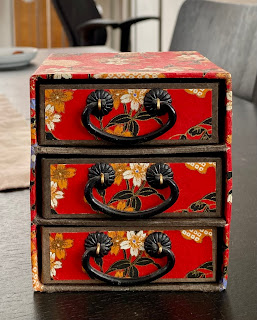 |
|
OK, I admit it. I have put a lot of the books back on the bookshelf, in part because I haven't even read some of them or don't remember them well enough to decide whether they should go or stay. On the other hand, others might need the environmental books more than I do. This Photo by Unknown Author is licensed under CC BY-NC-ND |
Why do we become hoarders?
As I’ve been working through my cupboards and drawers, I’ve been wondering where my packrat instincts have come from? Psychologists are only just starting to look at hoarding behaviour from a mental health perspective and have noted changes in the brain of those who do so compulsively, but since they don't seem to have made much progress, I'm happy to offer them my take.
Past Scarcity
My theory is that is that just as people who’ve always had enough to eat rarely have a weight problem, those who have had to do without, been poor or were given things rather than the affection or attention they needed, will always have difficulty just throwing things away.
We had virtually nothing as children. As well as being immigrants, we moved far too often to accumulate anything. We made cushions, dolls and puppets out of old stockings and
fabric remnants and nearly all our clothes were hand - me- downs.We were certainly never allowed to throw anything out. Frugality and thrift were virtues outside our home too, even when not a necessity. Our wealthy neighbours didn't go in for conspicuous consumption either and at least one family we knew was using torn up rags rather than bought dishcloths. Anyone who went through wartime rationing is in danger of becoming a hoarder too.
I'm convinced you can inherit hoarding too. Both my Dad in Germany and my Aussie ex -father -in -law grew up in the Depression. Father -in -law was one of seven children. Despite being well off in later life, he wasn't too proud to pick up screws and odds and ends found by the roadside. I can't speak for the rest of the family, but my husband was the same and his children seem to have acquired this trait as well. The difference was that Grandad had a very large workshop where each of his treasures had an allotted place and he could lay a hand on the 5" hex nut found on the road in '92, the moment anyone needed one.
 |
| Durability - they don't make things like they used to any more - too bad there's no film |
Present Scarcity
Let’s not forget actual scarcity either. I have lived in
remote places where you couldn’t just go to a shopping centre and pick up what
you needed. That’s why places like Tullah had an improvised recycling centre
long before recycling was a thing. Just moving your belongings to new places was costly –
more expensive than buying something new, so that was another reason for perfectly
good things ending up at the "Tullah Kmart" part of the tip. Perhaps we need something like "hot desking" for houses, with each one fully furnished with the necessities of life, right down to the crockery, the books and the appliances.
Life in the country has often been hard anyway, especially here in Tasmania, so at farm clearing sales even the most broken down items would be parcelled up with a few desirable objects, so that they would find a new home. No doubt someone, somewhere would be grateful for them, even if only as spare parts or kindling. It does make people very resourceful. Kitchen dressers made of kerosene tins are now desirable collectables in Australia. The question for me is less the Marie Condo one – does it bring me joy? but rather -would I miss it if the house burnt down? My ex – Mum – in -law’s motto was,”If it hasn’t been used for a year, throw it out,” which was possibly the only way she could keep her sanity in a house full of hoarders.
Fear of future Scarcity
Another fear haunts me too. Abundance has rarely been part of the human condition. Historically periods of plenty have been few and far between and certainly not universal. We’ve seen how easily our very long supply chains can be disrupted. A war here, a hissy -fit there, a shortage of fuel or some other material could throw us back into the Dark Ages, especially if we no longer have skills or tools to make things ourselves.
Few recent civilisations, other than Easter Islanders have faced the prospect of resources running out altogether. We are already pillaging our national parks, the deep oceans and eyeing off space. We simply cannot have eight billion people consuming at this rate nor can we afford items like the $7 toasters that break as soon as the one year warranty runs out. My old Sunbeam made of solid stainless steel is still going twenty years on, yet now even top of the range items such as the Asko Dishwasher and the Electrolux Vacuum Cleaner can no longer be fixed because parts are no longer available. Miele did in fact still stock the part for my range hood, but after two tries by the official repairer, it still falls apart at the first touch.
Both Miele and Soda Stream have offered me a discount on replacement models, but why would I put myself through that again? I also have a terrific little food chopper
which just needs a replacement glass bowl, but that’s no longer available
either. Perhaps someone at the
repair café, will have one with a burnt out motor and there'll be a happy marriage as there was for the fan heater. The
electronics pile is also growing with dead laptops, old phones and leads
and chargers that worked for gadgets we no longer own. Perhaps someone
somewhere can use them, but how do we find them and where could we store them
in the meantime?
To combat such wilful destruction the EU has already passed laws to ensure that parts must remain available for ten years and that products must be able
to be dismantled without requiring specialist tools. The French have gone
even further, passing some 50 laws relating to repairability and durability. As
well as having repairability ratings on new products, they have banned
goods
which can't be repaired - that is, those that are glued or welded
together. Although the laws mean manufacturers must pay the cost of retooling and training, France plans to have tax breaks for those who do the right thing.There will
also be discounts for customers who use
professional repair services. That's currently a major barrier here in
Australia where it costs an arm and a leg just to have someone look at a
non -working appliance, only to be told that it will cost more to repair than a new one. One item which didn't make it into law, was the one about software upgrades - the reason my printer couldn't be used any more. Not even Spellchecker works on my computer now, which means you will now get lots of extra spaces and typos.
I also would also have liked to see more
interchangeability of parts between models and brands such as we now
have for chargers -and more modular parts that can be reused over and over. Surely greater standardisation would mean big savings for companies as well.
Sentimental Clutter
I find it very difficult to part with are things which have meaning beyond their utility. Small things which kind people have given me in my travels, Dad’s old box camera, children’s artwork, boxes of photos from those pre -digital times, a couple of my sons' Matchbox cars, bits of jewellery and even a brass scone -cutter from my tearoom days. Fortunately they don't take up much space and add a bit of colour to unlikely places. I am guilty of keeping lots of notebooks - my life in plastic storage bins. Please don't tell me to upload them. That's what killed my last computer. I have however, done away with most other paperwork - I no longer print things, rarely mail - only three cards this year to non -digitally accessible friends. I no longer buy newspapers unless they are online and have restricted myself to one small book purchase this year.
 |
| From Yuko, a Japanese friend |
 | ||
| From Judy one of my Korean students |
It is sobering to sit among the pieces of my life, but it does make me extremely cautious about acquiring more things. They aren't a bargain or a saving if you have to spend hundreds of dollars storing them. I don't, but if I don't do this from time to time, I'm going to need a bigger house.
 |
| Bliss' fish kite |


Comments